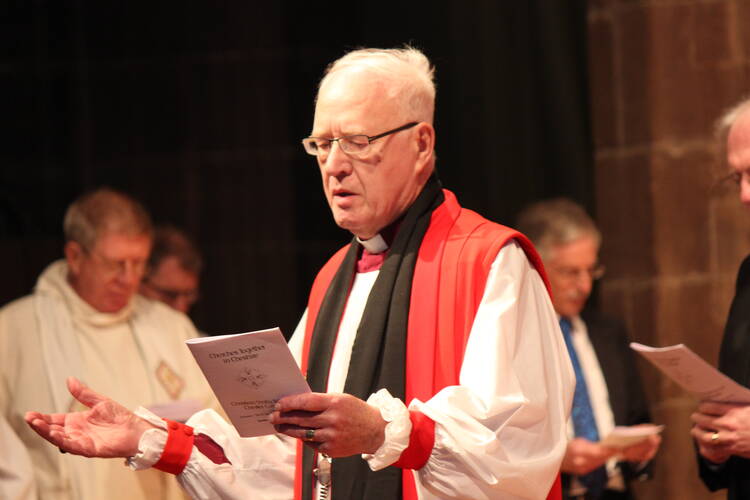Assisted Suicide Split
Just months after Belgium passed an assisted suicide bill, the British Parliament is now considering a similar measure. Even more controversial than the bill itself is the support it has received from an unlikely source. Lord George Carey, the former Anglican archbishop of Canterbury who is a member of the British Parliament’s House of Lords, has spoken in favor of the assisted suicide bill, saying, “The old philosophical certainties have collapsed in the face of the reality of needless suffering.”
Lord Carey previously opposed assisted suicide but stated his reversal was not “anti-Christian,” reasoning that “in strictly observing the sanctity of life, the Church could now actually be promoting anguish and pain, the very opposite of a Christian message of hope.” The current archbishop of Canterbury, Justin Welby, however, has called the measure “mistaken and dangerous.” In The Guardian newspaper, Giles Fraser, an Anglican priest and journalist, offered an impassioned defense of the pro-life view, arguing that in Christianity “human life has to be outside of oneself to be meaningful,” and that to assist in someone’s suicide is not an act of love.
Father Fraser is correct. It is regrettable that a split has occurred among prominent members of the clergy over profound issues of life and death. Nevertheless, since the days of Sts. Peter and Paul, disagreements, even about fundamental issues, have been part of Christian life. It is important that we approach this tension in a spirit of fraternal love. The mark of Christian communities has always been generosity. May it remain so.
From the Plains of Nineveh
The status of Iraq’s ancient Christian communities has grown progressively worse since the U.S. invasion in 2003 unleashed the nation’s sectarian demons. Their situation reached a new low in July with the expulsion of the Christian remnant from Mosul, Iraq’s second largest city, and the destruction and desecration of Christian holy sites. Militants from the Islamic State of Iraq and Syria advised Mosul’s Christians to convert, flee or “face the sword.”
Many of the Christians who remain in Iraq have found a tenuous refuge in northern Iraq’s Kurdistan. What will become of these people, and who has the responsibility to protect and restore them? Iraq’s fractured and fractious central government, dominated by Shiites, has not shown the will or capacity to protect religious minorities, and resettlement in Kurdistan does not appear to be an acceptable long-term option.
While members of the international community express regrets, France has taken practical steps to assist Iraq’s Christians and has offered them asylum. The Obama administration has been largely silent on the plight of Iraq’s minorities.
Having broken Iraq, the United States “owns” much of this crisis and must step up to its obligations. It should take an active part in delivering humanitarian assistance and should join France in opening its doors to Christians and other minorities fleeing Iraq. The United States is obliged to devise a long-term strategy for the resettlement and restoration of this ancient community within U.S. borders if it is incapable of doing so within Iraq’s increasingly tenuous boundaries.
Corrected Sentences
An estimated 46,000 nonviolent drug offenders—nearly half of all federal drug inmates—could benefit from reduced sentencing guidelines recently approved by the U.S. Sentencing Commission. The change comes amid a growing bipartisan turn away from the tough-on-crime penalties enacted at the height of the war on drugs that have overcrowded federal prisons, eaten up law enforcement budgets and disproportionately affected racial minorities.
In July the commission voted unanimously to apply retroactively a change to sentencing guidelines passed earlier this year that reduces prison time for most drug crimes; eligible inmates could see their sentences shortened by an average of about two years. While the commission’s decision is a welcome and prudent check on unjust and excessive incarceration in this country, its recommendations do not address the primary cause of the prison population explosion: mandatory minimum sentences.
It is now up to Congress to pass the Smarter Sentencing Act, which remains stuck in the Senate. The bipartisan bill would drastically reduce many drug-related mandatory minimums and give judges greater flexibility in sentencing low-level offenders. A second measure, the Recidivism Reduction and Public Safety Act, also stalled in the Senate, would expand job training, academic opportunities and drug treatment to ease inmates’ reintegration into society.
In a recent letter to international criminal law experts, Pope Francis wrote, “In our society, we tend to think that crimes are solved when the offender is captured and sentenced.” But for many offenders, the end of their sentence is just the beginning of a long, lonely journey on the other side. As people of faith, it is incumbent upon us to walk with them.








